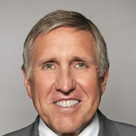
Francois Bausch
Minister of Infrastructure and Sustainable Development
Logistics / Luxembourg
“We are investing €3.8 billion to extend and modernize our rail infrastructure”
Luxembourg’s current big infrastructure investments, which include rail, air and urban modernization and expansion, are geared towards making industry greener and more efficient, while also enhancing the country’s quality of life, says François Bausch, Minister of Infrastructure and Sustainable Development
What are the government’s main infrastructure projects and strategies now?
We plan to build a new airport city in front of the airport, in order to localize offices of logistics companies. We also will enlarge our cargo center by next year. It is already Europe’s fifth-most important cargo airport, with a tonnage level of 1million. Logistics is our third-most important sector. Government infrastructure investment is a key part of our national economic diversification strategy. Our dual hub strategy includes the airport and the railway company, CFL, located in Bettembourg in central Luxembourg. CFL’s multimodal hub is one of Europe’s ost modern- a huge and multi-modal port that transfers cargo from trucks to the railway. A third pillar connects our airport and rail hub with our river port of Mertert, which links us to big North Sea harbors like Rotterdam and Antwerp.
How is the government working to develop the sub-logistics cargo industry?
We are investing €3.8 billion to extend and modernize our rail infrastructure. We’ll also invest a lot in the airport. We have enlarged the passenger terminal; now we’ll work on the B terminal for smaller aircraft. Luxembourg is a very safe harbor, with strong political stability, and significant infrastructure investment.
How does landlocked Luxembourg compete with larger countries on logistics?
Luxembourg is ideal for logistics, where the ‘just in time’ factor is so important. Most incoming products are re-exported across Europe. Qatar Airways, for one, switched much of its work here from Lièges due to our excellent handling. Our tax situation is better than our neighbors, and decision-makers are easily reachable.
What synergies are you developing in the logistics field with U.S. companies?
We have excellent collaboration with the US. Cargolux operates in many US airports, and we even have the rights now to go from China to Chicago. More destinations will open. We’d like to be able to process U.S. customs clearances in Luxembourg, and are discussing this with the American authorities.
What other key public construction projects is the Government planning?
We are investing €700 million in a 16.4km tram network from the airport across the city, linking all major economic hubs. Nine multi-modal hubs on this network will serve as exchange places, with a park-and-ride lot, a train, a bus station, electric car charging stations, secure bike storage, etc. We will then develop this nationwide. Our agreement with Germany and France will launch a test pad for cars and shuttles without drivers. We expect these technologies to be among the major economic sectors of the next 20 years. Goodyear has a major research center in the northern town of Colmar Berg. We are planning a new automotive cluster there.
Does Luxembourg have initiatives for eco-friendly, sustainable projects?
We annually award those logistics companies most committed to a sustainable strategy for ‘green logistics.’ The transport sector needs to be decarbonized urgently. Our program will create 1,600 charging points for electric cars. We’re also in discussions to implement hydrogen stations, which is important for trucks.
How do you envision the future role of Luxembourg in Europe and the EU?
Luxembourg’s economy will revolve around four pillars: finance, ICT, logistics and environmental technologies. I see it becoming a country with excellent infrastructure and no congestion problems, and also a hub for sustainable logistics, located in the very heart of the European Union.
